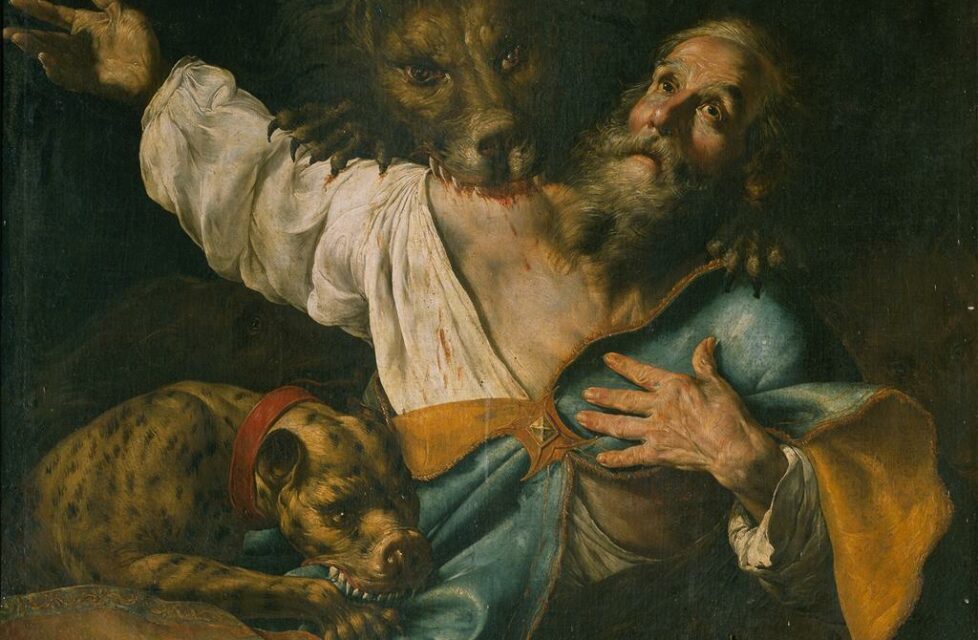A news flash alerted the world: “Five Men Missing in Auca Territory.” The date was Monday, January 9, 1956. A team of missionary pioneers trying to make peaceful contact with an infamous tribe of Indians in Ecuador, the Waodani, had failed to make a scheduled radio call. For almost a full day no word had come from their camp on the Curaray River, which they named “Palm Beach.” Then a hovering pilot reported the badly damaged plane at the camp. This was followed by a gruesome confirmation on Wednesday, January 11, when the first body was spotted in the river. Though a search and rescue team was quickly formed, the discovery of more bodies quickly changed the mission from rescue to retrieval and burial. By Friday of that week the team reached the missionaries’ campsiteand hurriedly buried four of the bodies. The men had died violently fromrepeated spear wounds and machete cuts. The fifth body (Ed McCully)was never located after being identified on the beach but then washedaway by the river. Five widows and eight orphans mourned the deathsand looked to God for comfort and direction. The world witnessed instunned amazement. Shockwaves from the tragedy traveled around the globe. Eventually,thousands
Read MoreAs he was about to be burned at the stake, Walter Mill confidently and courageously exclaimed: I marvel at your rage, ye hypocrites, who do so cruelly pursue the servants of God! As for me, I am now eighty-two years old, and cannot live long by course of nature; but a hundred shall rise out of my ashes, who shall scatter you, ye hypocrites and persecutors of God’s people; and such of you as now think yourselves the best, shall not die such an honest death as I do now. I trust in God, I shall be the last who shall suffer death in this fashion for the cause of this land! His words were prophetic because he was, in fact, the last martyr ofthe early reformation in Scotland. Born in 1476, Mill became a priest in Angus County, Scotland.Impressed by the teachings of the reformers, he questioned the churchhierarchy and theology and stopped saying Mass. So as a young man,he was condemned to death for his defiance of the church. Eventually,in 1538, Mill was arrested, but he escaped to Germany where he ministered for twenty years. At the age of eighty-two, he returned to teach the Protestant faithand live
Read MoreEven as a youngster, Just de Bretenieres dreamed of faraway placesand missionary service. He was born in the Burgundy region ofFrance to devoted Catholic parents. One day at the age of six, deBretenieres was playing with his younger brother, digging holes in theground. Suddenly he shouted, “Quiet, I hear the Chinese, I see them.They are calling me. I have to go to save them.” De Bretenieres neverforgot this incident, and as his devotion to faith grew, so did his sensethat his life must be given to carrying God’s salvation to foreign soil. Not yet twenty, de Bretenieres entered “minor” seminary in Paris,then went on to the Foreign Missions Seminary. Childhood dreamsmay have taken him there, but those dreams had to grow up, deepen,mature. In 1861 he wrote to his parents: “I sense quite well the road Iam taking is rough and difficult. I am not deluding myself about itsobstacles and sufferings, nor to the dangers I will meet. I place myselfentirely in God’s hands.” Graduates of the seminary were never told beforehand where theywould be sent. A priest was to simply follow orders, adjusting and accepting his assignment, aware that the ticket to foreign service was often “one-way” and that
Read MoreThe Jesuits arrived in Japan in 1549, the great missionary St. Francis Xavier leading the campaign to convert the island people.Along with them came traders, whose goods were valued even ifthe Godwords of the priests were greeted with respectful curiosity butnot much enthusiasm. Yet a small church grew. In 1597, Japan’s ruler, Toyotomi Hideyoshi, came to believe that histroubles were due to a loss of nationalistic fervor. Thus he directed thecleansing that outlawed Christian worship and led to the arrest of twenty-six Christian men, nineteen of them Japanese. Following a monthlongwinter march, the men were crucified on Nishizaka Hill on crosses cutto fit the dimensions of each of the condemned. It is said that when thecolumn of prisoners saw their crosses lying in the wheat field beside thehill, they each embraced theirs, and one of the condemned asked that hishands be nailed to the crossbar. For the rest, chains and iron straps keptthe men suspended until a squad of executioners finished the work bypushing spears into their chests. The men were a mix of ages and backgrounds. Louis Ibaraki wasonly twelve years old. He died with a child’s vision of flying from hiscross into Heaven. John of Goto was nineteen,
Read MoreThree months before the death of Jan Hus in Constance, Germany,a Bohemian scholar named Jerome secretly snuck into the city.He had already escaped from prison in Vienna, and had boldlymade his way to Germany, without protection, to try to help his friendHus. Jerome had translated the writings of John Wycliffe into the Czechlanguage, which Hus had read and followed. Feeling perhaps that it washe, Jerome, who should have been arrested, he bravely wrote letters tothe emperor and the Council of Constance, pleading for safe conductand to be heard on behalf of Hus—but they refused. Having done all hecould, he made his way back to Bohemia. He never made it home. As he traveled through a small town inGermany, the Duke of Sulzbach sent an officer to illegally arrest him.Chained around the neck and shackled, he was led back into Constanceas if he was the center of a parade. Surrounded by men on horseback andmany more guards, they took him to a degrading prison to await trial. Later, during which time Hus was martyred, the Council of Constance still refused to let Jerome speak. They knew he was a persuasive,intelligent scholar, and were afraid of his ability to defend the Christianfaith.
Read MoreIn the Greek myths, the character Telemachus (meaning “far-awayfighter”) was a timid and diffident child. But as an adult he defendedthe honor of those he loved and became a fighter and a hero. Unlikehis mythological counterpart, the fourth-century monk Telemachus wasanything but a fighter. Or perhaps it can be argued that his greatest fightwas his effort to eradicate fighting. An ascetic hermit from the East and unknown except for his finalact, Telemachus journeyed to Rome just in time for the victory celebrations. After years of aggressive invasions from the continent, Rome had finally defeated the Goth king Alaric in northern Italy in 403. As was common in those times, extravagant gladiatorial contests wereheld in celebration of military victories. The twenty-year-old emperorHonorius decreed that this particular celebration would be held in the50,000-capacity Coliseum, a battleground named for the colossal 130-foot statue of Nero nearby, the emperor made famous for condemningChristians into human torches. If there was one place in all of Rome thata pacifist Christian might consider avoiding, the Coliseum was it. Telemachus, a “rudely clad man of rough but imposing presence,” resolved to interrupt, indeed to stop, the bloody contest in the Coliseum. Thousands had gathered that day. Cries of
Read MoreTom and JoAnn Doyle share the stories of Jesus reaching women across the Middle East—amazing stories of God’s work in Saudi Arabia, Lebanon, Syria and other nations. Their new book, Women Who Risk: Secret Agents for Jesus in the Muslim World, shares exciting stories of Muslim women coming to faith in Christ, then becoming "secret agents" for Christ and His Kingdom—transforming their own lives, their families, friends and even entire nations. They will share how the Bible’s teachings about women are vastly different from the teachings of Islam—and how Muslim women respond when they learn how the God of the Bible loves women. Tom and JoAnn have been with us before on VOM Radio. You can hear those conversations here. Never miss an episode of VOM Radio! Subscribe to the podcast.
Read MorePerpetua bravely held Felicity in her arms, anticipating their deathtogether as sisters in Christ. The bull’s horns had already woundedFelicity, and the crowd wanted the coup de grace. Then, abruptlyand inexplicably, the bull stood still. The crowd hushed. This animal wasnot following the script. Now the crowd let loose with demands forblood, and gladiators rushed forward to finish the work. Felicity diedquickly. When Perpetua’s executioner hesitated, she herself helped guidehis blade into her body. The Coliseum had never before seen such a spectacle. Perpetua camefrom a wealthy family. Her father was pagan but her mother and brothers were Christians. Perpetua had a nursing baby at the time of her arrestfor confessing Christ. Her father urged her to renounce faith, for hissake and for her family. Even Roman authorities urged her to offer asimple sacrifice to Roman power. She refused. She would not renounceChrist as Lord, claiming that the name that belonged to her was thename of a Christian. Felicity was a slave—and pregnant. Since Roman law prohibitedthe execution of pregnant women, sentence was delayed. Felicity gavebirth in prison to a baby girl that would be adopted by Christians. Whenprison guards wondered how she would handle facing beasts in thearena, especially
Read MoreUnlike his apostolic companions, John died quietly in the city ofEphesus, serving the church he loved. But he didn’t live a quietlife. By the time he died, John had been part of the twelve disciples of Jesus, participated in the early life of the church in Jerusalem,traveled widely, and had written five New Testament books (the Gospelof John, the letters 1 John, 2 John, 3 John, and Revelation). John certainly had an impressive résumé of accomplishments, but he would probably have been the first to point out that anything he had done in life paled in comparison to what Jesus did for him. John’s character résumé tells us a lot about the ways Jesus changes a person’s life. The fact that John survived the other apostles points to the kind ofunique suffering he endured. All of the other disciples suffered and died;John suffered and lived. Though not technically a martyr, John’s lifedisplayed a martyr’s qualities. He was a living sacrifice worthy of imitation. And as we shall see, he only escaped actual martyrdom by God’sintervention on several occasions. John and his brother James were two of the more fiery members ofJesus’s disciples. Artistic renditions and personal impressions often create a
Read MoreBartholomew came as a reluctant seeker, brought to Jesus byPhilip, who couldn’t wait to spread the word about the Messiah.Bartholomew’s initial response to news about Jesus was a mixture of skepticism and sarcasm: “Can anything good come out of Nazareth?” (John 1:46). As he had done the day before when meeting Simon, Jesus greetedBartholomew with perceptive and challenging words. Jesus immediatelylet Bartholomew know that He really understood him. Imagine a persongreeting you with, “Behold, an Israelite indeed, in whom there is nodeceit!” (John 1:47). Bartholomew was stunned. “How do You know me?” he blurted.Jesus had just identified his central impulse. He didn’t feel complimented;he felt completely known. He was curious about how Jesus did it; towhich Jesus responded with a description of Bartholomew’s locationwhen Philip found him. Jesus’s perception was enough to convince Bartholomew that Philip was correct. This was in fact the Promised One.And he said so: “Rabbi, You are the Son of God! You are the King ofIsrael!” (John 1:49). Jesus received Bartholomew’s declaration with thepromise that he would eventually have many more reasons for recognizing the Son of God. Bartholomew was one of the group of five apostles who began tofollow Jesus shortly after His wilderness experience.
Read More

